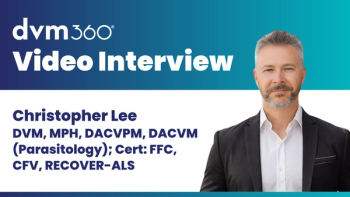
- dvm360 May 2022
- Volume 53
- Issue 5
- Pages: 35
Novel veterinary oncologic treatments and diagnostics

Craig A. Clifford, DVM, MS, DACVIM (Oncology), offered an overview of the latest treatment and diagnostic tools accelerating veterinary oncology
Cancer is one of the leading causes of death in dogs over 10 years old, with 50% of canines developing the disease.1 At the Fetch dvm360® conference held in Charlotte, North Carolina, Craig A. Clifford, DVM, MS, DACVIM (Oncology), detailed innovative products and technology to provide the best care and quality of life for oncologic patients.
ImpriMed chemotherapy sensitivity assay
According to Clifford, ImpriMed offers a precision medicine service to predict a patient’s response to a drug by using artificial intelligence (AI) algorithms that combine immunophenotyping data, live cell-based chemosensitivity results and a patient’s clinical data.2 Veterinarians submit patients’ samples by using a fine needle aspiration biopsy and the test kit provided. Within just 7 days, they receive AI driven, personalized, anti-cancer drug response predictions.
ImpriMed analyzes the live cells and indicates the chance a patient will respond to a specific drug and compares your case to the average dog. It also tells veterinarians the timeline of when the patient will likely respond to treatment and can predict how a patient will do overall regarding B-cells versus T-cells, high prediction versus low prediction scores, etc.
“It can help us choose drugs that will work or potentially not choose drugs that we think are going to be less effective,” Clifford said. “It’s truly a first step with personalized medicine...the genetics of the cancer is actually helping guide how we’re treated on the physician-based side, and we’re getting there now in veterinary medicine.”
Clifford noted ImpriMed services should be considered for both naïve or relapsed patients to2:
- See accurate immunophenotyping and chemosensitivity assays to better support treatment (especially for atypical lymphomas that there is less research on)
- Detect possible cyclophosphamide, doxorubicin, vincristine, and prednisone (CHOP) failure patients
- Predict anti-cancer therapies for patients with comorbidities or contraindications
- Provide single agent therapy for pet parents with financial limits
- Find the ideal option with fewest doses/month or a dosing schedule when patient lives far away
Laverdia CA-1
Laverdia CA-1 is an oral anti-cancer targeted treatment for all forms of lymphoma that utilizes selective inhibitor of nuclear export (SINE) technology that is also used in human medicine. Clifford explained that during a study analyzing quality of life when taking the drug, most owners felt their pet maintained a good quality of life even when the disease progressed, so a significant number of patients remained on the drug because they felt content.2
“I feel more likely [Laverdia CA-1] is going to be a primary care drug. I think oncologists, we’re going to try and figure out where we put it in the protocols, but I really do see it as a bridge to getting to treatment or in the cases where the owner doesn’t want to go further,” Clifford said.
“That means more cases are going to be treated and there are maybe some cases that have a greater response, and the owner then elects to go for treatment and that’s wonderful too because then you know that dog is going to likely live longer and that wouldn’t have happened if we didn’t have that bridge to get there,” he continued.
Some adverse effects of Laverdia CA-1 include anorexia, weight loss, vomiting, diarrhea, and vomiting so it is important to do weight assessments during follow-up visits. It is to be given at 1.25/mg/kg twice weekly to a minimum dose of 1 mg/kg twice per week with at least 72 hours between doses.2 It is available in 3 doses: 2.5 mg per tablet, 10 mg per tablet, and 50 mg per tablet.
Clifford noted that there is limited data currently available surrounding Laverdia CA-1, so it is difficult to draw too many conclusions. Thus, there is going to be be a learning curve with it and investigator driven trials must be completed to determine which cases to use it for, how to adjust the dose, which chemotherapy drugs it may be best combined with, plus more.
OncoK9 liquid biopsy test
OncoK9 is a noninvasive liquid biopsy test using a simple blood draw designed for early screening of canine cancer. Using cutting-edge technology, it is highly accurate in finding certain genetic sequences associated with 30 types of cancer to indicate if a patient has a risk developing it.
“Using next generation sequencing, [OncoK9] is considered high end. What they have been able to find is certain genetic sequences that are common to many cancers so you can imagine if it's positive, there is a high probability the patient has cancer," Clifford shared. “It’s not affected by inflammation; it’s not affected by if the patient ate or anything like that; those don’t play a role in it."
Clifford added it is ideal as an annual screening test for dogs at higher risk of cancer (ie, those over 8 years old and predisposed breeds). Some breeds predisposed to cancer2 include golden retrievers, German shepherds, Boxers, Bernese Mountain dogs, and more. OncoK9 also aids as a diagnostic test for canines in which cancer is suspected.
“All of these groups have come out and said what we already know: wouldn’t it be nice if we could diagnose [cancer] earlier? Meaning, we can find the cancer before it’s metastasized if its osteosarcoma or angiosarcoma, wouldn’t it be great to catch it when it’s at its lowest point? That’s our greatest chance to impact overall survival,” said Clifford.
Takeaways
Summarizing his points to conclude the lecture, Clifford stated ImpriMed is a novel tool for select cases and may change how atypical lymphoma is treated. Additionally, Laverdia CA-1 is a convenient and effective oral treatment option and post-market research will determine its niche, plus the OncoK9 liquid biopsy test is best for older or predisposed breeds and in circumstances where cancer is a concern.
References
- Davis BW, Ostrander EA. Domestic dogs and cancer research: a breed-based genomics approach. ILAR J. 2014;55(1):59-68. doi:10.1093/ilar/ilu017
- Clifford CA. Recent advancements in oncology. Presented at Fetch dvm360® conference; Charlotte, North Carolina. April 22-24, 2022.
Articles in this issue
over 3 years ago
The impact of Fear Freeover 3 years ago
The secret to happy clientsover 3 years ago
An encouraging phone call and a flopping horseover 3 years ago
Euthanasia attendants in modern practiceover 3 years ago
Lyme disease risk forecast to increaseover 3 years ago
Maximizing adherence to minimize heartworm resistanceover 3 years ago
A closer look at hydrotherapy for rehabilitationover 3 years ago
Why a blood smear evaluation should be performed with every CBCNewsletter
From exam room tips to practice management insights, get trusted veterinary news delivered straight to your inbox—subscribe to dvm360.






